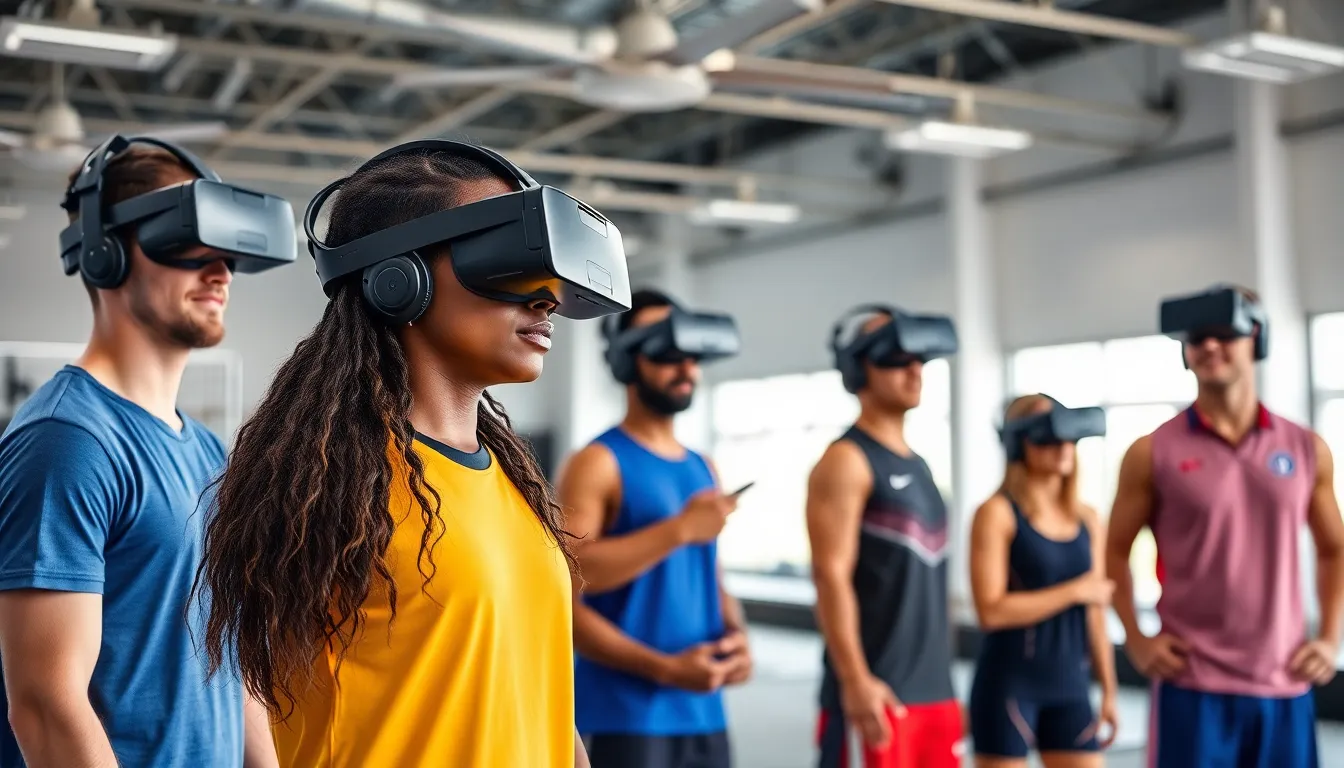In the fast-paced world of sports, technology is the secret MVP, transforming how athletes train, fans engage, and games are played. From wearable gadgets that track heart rates to apps that make watching a game feel like a front-row seat, sports tech is changing the game—literally. If you thought your fitness tracker was impressive, wait until you see what’s cooking in the tech lab.
Sports Tech News
Technology continues to shape the sports industry with groundbreaking tools and devices, enhancing both performance and experience. Innovations in wearable technology and smart equipment lead the charge in sports tech advancements.
Wearable Technology
Wearable technology remains a game-changer, providing athletes with data-driven insights. Devices like fitness trackers and smartwatches monitor heart rates, sleep patterns, and movement metrics, enabling athletes to optimize their training regimens. Companies such as WHOOP and Garmin offer products tailored for performance analysis. Coaches utilize this data to create personalized training plans, improving overall performance and recovery. Athletes gain a competitive edge by tracking progress closely, allowing for timely adjustments that enhance results.
Smart Equipment
Smart equipment is revolutionizing how athletes train and compete. For instance, intelligent basketballs measure shooting angles and speed, delivering immediate feedback for improvement. Soccer balls equipped with sensors collect data on kick strength and accuracy, which enables players to refine their techniques. Companies like Wilson and Adidas are at the forefront of this technology, producing gear that enhances performance while increasing player engagement. Accessories like smart racquets analyze swing patterns, providing insights that help maximize efficiency and effectiveness during practice sessions.
Emerging Trends in Sports Tech News

Emerging trends in sports technology significantly reshape training and engagement strategies. Innovations focus on enhancing performance and enriching fan experiences.
Data Analytics in Sports
Data analytics plays a crucial role in today’s sports landscape. Teams utilize data to assess player performance, strategy, and injury prevention. Multiple platforms now analyze player statistics in real-time, enabling coaches to make informed decisions during games. The adoption of data-driven insights promotes better training regimens and personalized athlete development plans. Companies like IBM and Catapult Sports provide comprehensive analytics solutions that offer teams a deeper understanding of their players’ physical and mental states.
Virtual Reality Training
Virtual reality training has transformed how athletes prepare for competition. Coaches and sports scientists incorporate VR to simulate game scenarios that improve decision-making and reflexes. Athletes engage with immersive environments, allowing them to practice skills without physical strain. Significant advancements in VR technology, provided by companies like Oculus and Strivr, facilitate realistic experiences that improve mental conditioning. The integration of this technology into training programs boosts performance effectively as athletes visualize success in highly competitive situations.
Impact of Sports Tech on Athletes
Sports technology significantly enhances athlete performance and safety. Innovations in this field provide cutting-edge tools that reshape training methodologies.
Performance Enhancement
Wearable devices offer real-time data on physiological metrics. These tools empower athletes with insights into their training intensity and recovery patterns. For example, fitness trackers from WHOOP and Garmin collect heart rate and sleep data, helping athletes optimize routines. Smart equipment further contributes by delivering instant feedback during practice sessions. Intelligent basketballs and soccer balls reveal trajectory and force data, refining skills and techniques. Companies like Wilson and Adidas are at the forefront, developing gear that boosts training effectiveness and maintains player engagement.
Injury Prevention
Injury prevention has benefited tremendously from technology. Real-time analytics play a vital role in monitoring athlete health. Teams utilize data from wearable devices to track exertion levels and fatigue, identifying potential risks early. Catapult Sports and IBM offer advanced solutions for gathering and analyzing performance metrics, enhancing athlete care. Moreover, virtual reality training provides scenarios that simulate game pressure, helping athletes prepare mentally. This method minimizes physical strain while improving focus and decision-making in high-stress situations.
Major Companies in Sports Tech
Sports tech is driven by innovative companies reshaping the landscape. These organizations, both startups and established corporations, greatly influence athlete performance and fan experiences.
Leading Startups
Emerging startups are pivotal in sports technology. Companies like Whoop focus on wearable health trackers that provide personalized insights into recovery and performance. Similarly, companies such as Nix Biosensors offer hydration monitoring solutions, enhancing athlete health in real time. Another notable startup, Hudl, provides analytics and video review tools to teams at all levels. Collectively, these enterprises leverage cutting-edge technology to create user-friendly applications that redefine how athletes train and recover.
Established Corporations
Well-known corporations dominate the sports tech scene. Companies like Nike integrate advanced technology into sportswear, improving performance through data-driven designs. Adidas takes innovation further with their Smart Ball, enabling athletes to analyze their techniques through embedded sensors. Additionally, IBM provides robust analytics solutions that help teams optimize strategies by examining player data. With these established players at the forefront, sports technology continues to evolve, enhancing training methodologies and the overall sports experience.
Conclusion
The evolution of sports technology is undeniably reshaping the landscape of athletics. With innovations in wearable devices and smart equipment athletes are gaining unprecedented insights into their performance and health. This shift not only enhances training but also elevates the overall fan experience.
As companies continue to push the boundaries of what’s possible the future of sports tech looks promising. Emerging trends such as data analytics and virtual reality training are set to redefine how athletes prepare and engage with their sport.
Ultimately the integration of technology in sports is paving the way for a more connected and efficient athletic environment. As advancements unfold the industry will witness a continual transformation that benefits athletes and fans alike.

